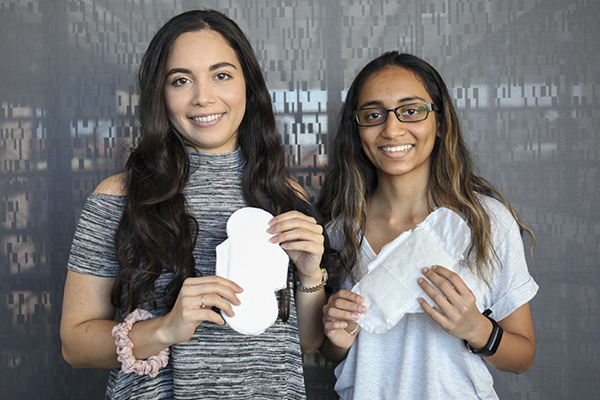Sanitary Aid for Everyone, an alumni and student-led research group, is working to create a biodegradable sanitary pad to help women without access to adequate facilities and menstruation products.
The organization is competing in the Texas Student Research Showdown to win grant money to fund this project, said member Iann Karamali, a mechanical engineering and humanities senior.
The group has already created three prototypes for the biodegradable pad, said member Amanda Macfarlane, a public relations and textiles and apparel senior. Once they develop the fourth, they plan to move onto trial testing, said Macfarlane.
Sanitary Aid for Everyone is a sister organization to the Women’s Relief Initiative, a group Guinean UT students founded in fall 2018, said group member Fatoumata Diallo. The initiative wants to bring menstrual products to women in developing countries, according to its website.
“I’ve always had an interest in helping women and girls around the world,” said Diallo, a health and society senior. “Especially because I grew up in Guinea. I lived a very privileged life, … and most of my friends didn’t have that privilege.”
In 2019, the initiative raised $1,500 in a GoFundMe campaign and sent sanitary pads to women in three villages in Guinea, Diallo said. However, one group member, Mamadou Balde, wanted to create a more sustainable solution for women in developing countries, said chemical engineering alumna Heny Patel.
“We were thinking about making our own sanitary pad products that we can just implement in these villages and women can make them by themselves and have an unlimited supply of them,” Patel said.
In August 2019, Patel said she and Balde brought together a group of engineering and textile students to form Sanitary Aid for Everyone and develop an environmentally friendly solution that meets the needs of women without access to sanitary products.
Macfarlane said most menstrual pads on the market are made from plastic and take hundreds of years to decompose in landfills. She said the organization’s biodegradable pad is made from cotton, corn husks and bioplastic algae.
The first layer is made of cotton which draws liquid away from the body, Macfarlane said. The second layer is made of corn husks, which holds liquid, she said.
“Imagine an empty box, you can put things in the box,” Macfarlane said. “Basically, plant cells are empty boxes that you can fill with water. As you add liquid to it, it expands, and it holds the water in all these tiny little boxes.”
The third layer is made of algae because it repels liquid, Karamali said. Algae can be collected from the ocean, dried and then ground into a powder to create bioplastic, Patel said.
The group chose these materials because they are indigenous to Guinea and are not used for other products, Macfarlane said. Since Sanitary Aid for Everyone partners with Women’s Relief Initiative, she said the group receives feedback about the product from women in Guinea.
“By keeping it with those women, you’re able to empower them to make something for themselves,” Macfarlane said. “It’s also about understanding that for these women that this is important and that they are worth it.”





















